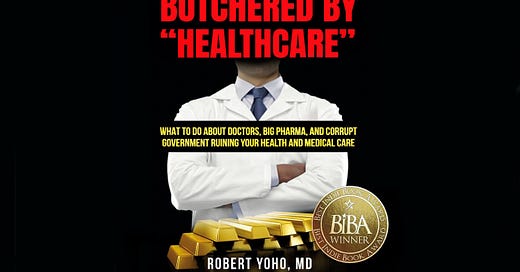Book Review: Butchered by 'Healthcare' – Exposing Old Tricks in a New Crisis
Big Pharma’s con is older than COVID. Robert Yoho, MD, exposes the same tricks—manipulated data, rigged regulators, and profit-driven lies—weaponized to sell “safe and effective” shots.
In Butchered by ‘Healthcare’ (2020), Robert Yoho, MD, lays bare the rot at the core of modern medicine—a system hijacked by Big Pharma, corrupted regulators, and profit-driven healthcare conglomerates. Long before the world heard the phrases “safe and effective” or “Operation Warp Speed”, Yoho’s exposé provided a roadmap of deception. For readers reflecting on the COVID-19 era, this book serves as a chilling prophecy and a field guide to understanding how the same old tricks have been used to manipulate public trust during the pandemic.
Yoho masterfully unpacks how pharmaceutical companies falsify studies, manipulate data, and suppress unfavorable outcomes. Sound familiar? Consider the rushed rollout of the COVID-19 mRNA shots—Pfizer and Moderna claimed astonishing efficacy rates of 95%, a statistic trumpeted globally to fast-track the shots. Yet these numbers, like the old antidepressant and statin studies Yoho highlights, relied on relative risk reduction rather than absolute risk reduction. In reality, the absolute reduction for COVID infection was a paltry 1% or less—an old sleight of hand, dusted off and used again to hoodwink an anxious public.
Yoho’s warnings about ghostwritten articles, bought-off journals, and industry-funded “key opinion leaders” are equally prescient. During COVID, scientists and doctors who dared question the injections were smeared as quacks, while corporate-funded experts dominated airwaves and headlines. The playbook remained unchanged: influence prestigious journals to amplify the narrative and suppress dissent. Take, for instance, The Lancet’s infamous retraction of a negative hydroxychloroquine study—it was only pulled after being exposed as fraudulent. Yet positive COVID mRNA claims, often built on similarly shaky ground, remained untouched.
The book also details how drug companies have perfected the art of disease-mongering—turning natural processes or manageable ailments into terrifying crises to drive drug sales. COVID-19 proved to be the magnum opus of fear-driven marketing. With constant news of death tolls, “cases,” and variants, the public was pushed to believe that only mass vaccination could save them. The risks of adverse events—whether myocarditis in the young or blood clots—were buried, downplayed, or labeled “rare,” much like how dangerous psychiatric drugs were pushed despite evidence of harm, as Yoho documents.
Another of Yoho’s sharp insights concerns regulatory capture: agencies like the FDA, ostensibly protectors of public health, are often little more than revolving doors for Big Pharma executives. During COVID, this capture was on full display. Emergency Use Authorizations bypassed long-term safety testing, while the very regulators tasked with oversight greenlit untested boosters with as little as eight mice worth of data. As Yoho noted well before COVID, when regulators are funded by the companies they oversee, public safety takes a backseat to profit.
The most damning parallels arise in Yoho’s discussion of corporate immunity. In past scandals—be it opioids or dangerous antidepressants—Big Pharma would pay fines but walk away richer than before, treating settlements as the cost of doing business. During COVID, the stakes escalated: vaccine manufacturers received blanket immunity from liability. If something went wrong with these experimental shots, the public would bear the cost—another hallmark of a rigged system Yoho so thoroughly exposes.
Yoho also warns of medical overreach and the silencing of independent voices, themes that resonate powerfully in the pandemic era. Physicians, once trusted arbiters of care, became enforcers of state and corporate agendas. Doctors prescribing alternative treatments like ivermectin faced sanctions, while patients were coerced into injections or denied basic medical rights under the guise of protecting “public health.” The system Yoho describes—where profits and compliance trump evidence and ethics—was on full display.
Final comments:
Butchered by ‘Healthcare’ reveals a medical system that abandoned its oath to “do no harm” long before COVID-19. Yoho’s meticulous exposure of fraud, manipulation, and profiteering within Big Pharma offers an urgent lens through which to view the COVID mRNA era. The same tools—fear, data manipulation, regulatory capture, and silencing of dissent—were weaponized yet again, but on an unprecedented global scale.
For anyone wondering how the “safe and effective” mantra became gospel while legitimate concerns were buried, Yoho’s work provides the answers. The COVID era was not an anomaly but the culmination of a system that has been conning the public for decades. This book is more essential now than ever. If you want to understand how we got here—and why history keeps repeating itself—Robert Yoho’s Butchered by ‘Healthcare’ is the definitive place to start.
Robert Yoho, MD, is a retired physician, author, and outspoken critic of the modern healthcare system. With over three decades of medical experience, including specialization in cosmetic surgery, Yoho spent the latter part of his career investigating the widespread corruption, inefficiencies, and profit-driven practices within Big Pharma, regulatory agencies, and the healthcare industry. After witnessing firsthand how patient care often takes a backseat to financial interests, he turned whistleblower, dedicating his time to researching and exposing systemic issues in medicine. His book, Butchered by ‘Healthcare’, reflects his commitment to empowering patients with the truth about the medical-industrial complex. Now retired, Yoho continues to write and advocate for reforms that prioritize ethics, transparency, and patient well-being.
Here is a list of books referenced in Butchered by ‘Healthcare’:
Worried Sick: A Prescription for Health in an Overtreated America – Nortin Hadler, MD (2008)
Examines the dangers of overtreatment in American healthcare, arguing that excessive medical interventions often cause more harm than good.Deadly Medicines and Organised Crime – Peter Gøtzsche, MD (2013)
Highlights how pharmaceutical companies manipulate research, falsify results, and prioritize profits over patient safety, likening their practices to organized crime.Anatomy of an Epidemic – Robert Whitaker (2010)
Investigates the long-term outcomes of psychiatric drug use, arguing that these medications often worsen chronic mental health conditions despite widespread prescribing.Final Analysis – Jeffrey Masson (1992)
A critique of the psychoanalytic industry, exploring its ethical failures and questioning the foundations of modern psychotherapy.Influence: The Psychology of Persuasion – Robert Cialdini, PhD (1984)
A foundational text on the principles of influence and persuasion, revealing tactics used in marketing, business, and interpersonal relationships.An American Sickness – Elisabeth Rosenthal, MD (2017)
A scathing analysis of the American healthcare system, exposing how financial incentives have corrupted hospitals, insurers, and drug companies.Bad Pharma – Ben Goldacre, MD (2012)
Explores the pharmaceutical industry's manipulation of clinical trials, unethical marketing practices, and suppression of unfavorable data.Pharmageddon – David Healy, MD (2012)
Argues that the pharmaceutical industry has created a crisis by overmedicalizing society and promoting drugs that often do more harm than good.The Danger Within Us – Jeanne Lenzer (2017)
Investigates the medical device industry, revealing the risks of untested implants and regulatory failures that endanger patients.How We Do Harm – Otis Brawley, MD (2012)
An insider account of U.S. healthcare failures, emphasizing how profit-driven practices often result in overtreatment and misdiagnosis.Bottle of Lies: The Inside Story of the Generic Drug Boom – Katherine Eban (2019)
Exposes corruption in the generic drug industry, revealing quality control failures and safety risks in drugs produced abroad.ChinaRx: Exposing the Risks of America’s Dependence on China for Medicine – Rosemary Gibson & Janardan Singh (2018)
Examines the U.S. reliance on China for pharmaceuticals, warning of supply chain vulnerabilities and quality issues.Overdosed America – John Abramson, MD (2004)
Argues that corporate-driven medicine and misleading research have led to overtreatment and declining public health in America.Hooked: Ethics, the Medical Profession, and the Pharmaceutical Industry – Howard Brody, MD (2007)
Discusses the ethical dilemmas of physicians influenced by pharmaceutical companies and calls for reforms in medical practice.Overtreated: Why Too Much Medicine is Making Us Sicker and Poorer – Shannon Brownlee (2007)
Highlights how excessive medical care and unnecessary treatments are harming patients and driving up healthcare costs.Born With a Junk Food Deficiency – Martha Rosenberg (2012)
Investigates the food and pharmaceutical industries, exposing their role in chronic illness through harmful products and aggressive marketing.American Meth: A History of the Methamphetamine Epidemic in America – Sterling Braswell (2008)
Traces the methamphetamine crisis, examining its cultural, economic, and societal impacts in the U.S.ADHD Nation: Children, Doctors, Big Pharma, and the Making of an American Epidemic – Alan Schwarz (2016)
Reveals how ADHD has been overdiagnosed and overmedicated, driven by pharmaceutical profits and societal pressures.ADHD Does Not Exist – Richard Saul (2014)
Challenges the legitimacy of ADHD as a standalone diagnosis, suggesting that underlying conditions are often misdiagnosed.The ADHD Fraud: How Psychiatry Makes “Patients” of Normal Children – Fred Baughman, MD (2006)
Criticizes the overdiagnosis of ADHD and the prescription of harmful drugs to children for behavioral issues.A Disease Called Childhood – Marilyn Wedge, PhD (2015)
Argues that modern parenting and cultural factors contribute to the overdiagnosis and overmedication of children.Dreamland: The True Tale of America's Opiate Epidemic – Sam Quinones (2015)
Chronicles the origins of the opioid crisis, exploring the role of pharmaceutical companies, addiction, and societal impacts.The Emperor's New Drugs: Exploding the Antidepressant Myth – Irving Kirsch (2009)
Debunks the efficacy of antidepressants, arguing that their benefits are largely due to the placebo effect.Hippocrates' Shadow – David Newman, MD (2008)
Exposes medical myths and inefficiencies, advocating for more evidence-based and patient-centered care.On the Take: How Medicine’s Complicity with Big Business Can Endanger Your Health – Jerome P. Kassirer, MD (2004)
Details how financial ties between physicians and industry influence medical decisions and erode patient trust.Overdiagnosed: Making People Sick in the Pursuit of Health – H. Gilbert Welch, MD (2011)
Critiques the culture of overdiagnosis and excessive screening, showing how it leads to unnecessary treatments.The Whistleblower: Confessions of a Healthcare Hitman – Peter Rost (2006)
A former pharmaceutical executive exposes corruption, fraud, and unethical marketing within the drug industry.The Obesity Code – Jason Fung, MD (2016)
Explains the causes of obesity, focusing on the role of hormones like insulin and advocating for dietary changes over calorie counting.Crooked: Outwitting the Back Pain Industry and Getting on the Road to Recovery – Cathryn Jakobson Ramin (2017)
Investigates the back pain industry, revealing how unnecessary surgeries and treatments often fail to help patients.America’s Bitter Pill – Steven Brill (2015)
Explores the Affordable Care Act (Obamacare), highlighting its achievements and failures in reforming U.S. healthcare.Malignant: How Bad Policy and Bad Evidence Harm People with Cancer – Vinay Prasad, MD (2020)
Critiques the cancer treatment industry, exposing how ineffective therapies are often marketed and overused.Ending Medical Reversal – Vinay Prasad, MD, and Adam Cifu, MD (2015)
Discusses how many medical practices are overturned when new evidence proves them ineffective or harmful.






An excellent piece! Thank you!
Great reporting.